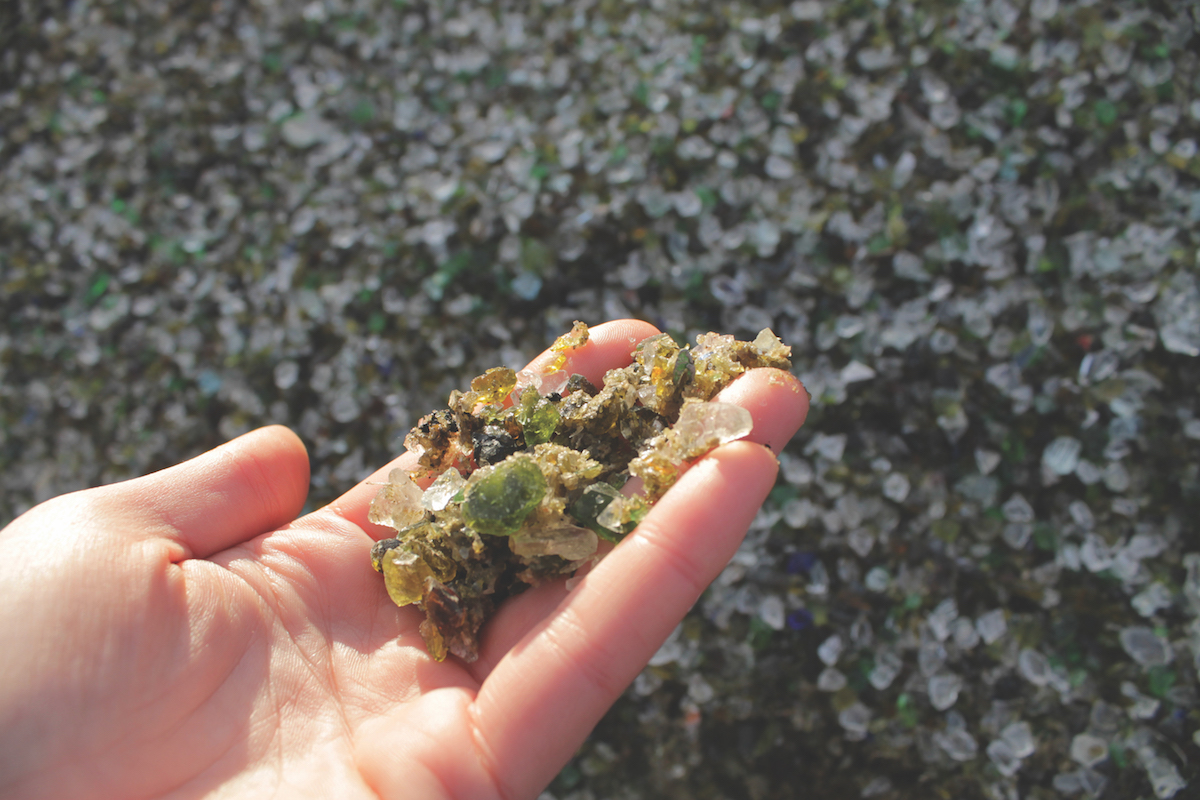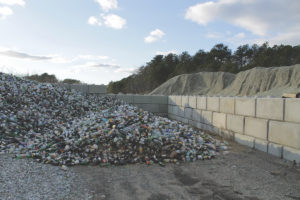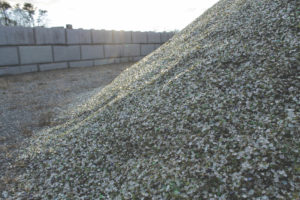
Garbage. It’s a story ripe with complexity. The Independent is dumpster diving into the subject to better understand where the Outer Cape’s garbage goes. In this second installment, we look at glass, with a focus on downcycling that turns it into construction material.
DENNIS — Shimmering in the low golden hour light, nearly a thousand tons of glass awaits its fate. A neighboring pile about half the size of the first, and looking more like jewels than pipe bedding, has already been “downcycled” into glass aggregate. It is ready to serve its purpose as construction material.
The site of this transformation is the Dennis transfer station, where a regional program has been filling a gap in the glass recycling market since 2019.
After months of single-stream recycling to accommodate Covid precautions at its transfer station, Wellfleet will return to a dual-stream system on Jan. 15. The towns of Wellfleet and Eastham both separate their recyclable materials. Eastham sends its glass to Carney Environmental in Raynham, where it is downcycled; of the four Outer Cape towns, only Wellfleet currently sends its glass bottles and jars to Dennis for crushing.
“It really doesn’t get much better than that when it comes to glass recycling right now,” said Wellfleet Transfer Station Foreman Mike Cicale.
The Dennis program got under way after a bottle manufacturing facility in Milford closed abruptly in early 2018, leaving towns scrambling. That facility was the only nearby place where glass could be recycled into glass, said Reagan Bissonnette, the director of the Northeast Resource Recovery Association (NRRA), a New Hampshire-based nonprofit that facilitates recycling programs.

Chad Contoni, the Dennis Transfer Station foreman, had previously suggested grinding glass into aggregate to the Mass. Dept. of Environmental Protection. The DEP scoffed at the idea, he said. Soon, without the Milford facility, and because glass is heavy and therefore expensive to transport, the DEP was taking a second look at downcycling. Dennis was awarded a $120,500 grant to do just that. The site was completed in May 2019.
“It’s also a huge victory for the idea of regional solutions that the Cape is becoming known for,” said Cicale.
The Crush
Dennis joined the NRRA and started collecting glass at its transfer station for processing into glass aggregate. When the weight of the glass reaches about 1,000 tons, NRRA hires a company to crush the glass on site.
In December 2019, Dennis had its first glass crushing day, Contoni said, and they are due for another one soon. The glass is pulverized into three-quarter-inch spheres, and the resulting material is called processed glass aggregate — PGA.
Although the DEP permits only glass bottles and jars to become PGA, Bissonnette said the type of glass crushed does not matter. What matters is how it is crushed — it must come down to 3/8-inch or smaller, she said, and have smooth edges, so that “you can rub it in your hands and you won’t cut yourself.” Its uses vary, she explained, but PGA is most commonly used as a replacement for sand or gravel in construction.
PGA does not freeze or heave, said Contoni, and it can be used underneath concrete walkways, in pipe bedding, or as filtration. Eastham’s downcycled glass, for example, is being used as backfill by the town of Orleans. In contrast to 3/8-inch gravel and stone, which can cost $26 per ton, said Contoni, PGA costs $10 per ton. Cicale added that the fact that it can be used locally, on Cape Cod projects, makes it especially economical.
The towns participating in Dennis’s program are required to take back the same amount of PGA as the weight of recyclable glass they contribute, ton for ton, unless Dennis finds another use for the PGA.
To participate, Wellfleet transports glass bottles and jars to Dennis and pays $75 per ton. “It’s a short distance compared to other places that we have to ship materials,” said Cicale.
Kari Parcell, the Barnstable County waste reduction coordinator, said the facility is open to all Cape towns that separate their recycled glass. Wellfleet is one of five towns now participating, along with Dennis, Barnstable, Mashpee, and Harwich.
Single-stream recycling programs, like those in Provincetown and Truro, send mixed recycling, including glass, to off-Cape recovery facilities. Provincetown uses Casella Waste Systems in Charlestown. Truro sends its single-stream recycling to E.L. Harvey in Westborough.
Is Downcycling Enough?
There is a downside to downcycling, Bisonette said. That’s because glass can be recycled endlessly without decreasing the quality of the material. “We would prefer to be recycling glass bottles back into glass bottles,” said Bissonnette.

Kirstie Pecci, director of the Zero Waste Project at the Conservation Law Foundation, agrees that PGA is not an ideal solution. The upside, she said, is the bottles are not taking up landfill space. Glass bottles and jars are banned from disposal in Massachusetts — by law, they must be recycled. But Pecci said there’s an even better solution than glass recycling: reuse.
“Bottle reuse,” she said, “is very doable — that’s what we should be shooting for.”
Until the mid-1970s, the reuse of glass bottles was common, said Pecci. Fewer beverages were bottled — it was mostly soda and milk. Not long ago, Provincetown residents could get fresh, local milk in glass bottles delivered to their doorstep. The last dairy farm in Provincetown, Galeforce Farm, produced and distributed milk in town for over 50 years until it closed in the early 1940s. The bottles were returned, sanitized, and reused, as was typical of the time.
Glass reuse could be making a comeback. Pecci pointed to a refillable beer bottle program in Oregon, which allows bottles to be returned for reuse up to 40 times.
“If you’re creating a product, and you control how that product is packaged,” said Pecci, “you should be given good incentives to make sure you design it in a way that it can be reused.”



